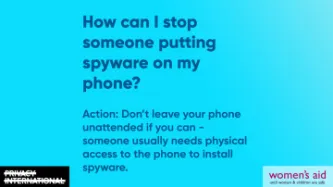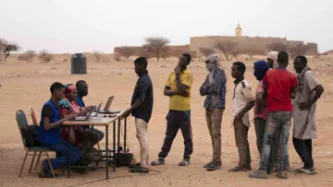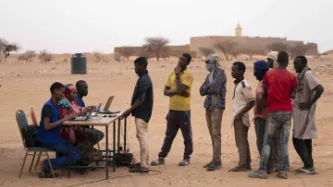Advanced Search
Content Type: Video
You can find out more about Haki na Sheria here: http://hakinasheria.org/
Find out more about double registration in Keren's piece "In Kenya, thousands left in limbo without ID cards" in CodaStory: https://www.codastory.com/authoritarian-tech/kenya-biometrics-double-registration/
Find out more about the Huduma Namba case on our website: https://privacyinternational.org/news-analysis/3350/why-huduma-namba-ruling-matters-future-digital-id-and-not-just-kenya
You can listen and…
Content Type: News & Analysis
This week, we read that a former Apple contractor who blew the whistle on the company’s programme to listen to users’ Siri recordings has decided to go public, in protest at the lack of action taken as a result of the July 2019 disclosures. The news adds to a series of revelations that have been reported over the past months.
While the issue raises serious questions regarding the compatibility of such practices with data protection laws, at the same time, it highlights a wider problem that…
Content Type: Case Study
You have the right to decent standards and dignity at work, and the right to join a union to protect yourself and your rights. That might come as a shock to Amazon - who have been using Covid-19 as a reason to undermine those rights.
Chris Smalls, an organiser and now former Amazon warehouse assistant manager, led a walkout at a New York City facility and within days he’d been fired under a dubious pretext.
The walkout was to ensure workers’ safety - they were asking for the warehouse to be…
Content Type: Long Read
Today is 1st May, an international day of protest. It also marks a year since PI launched our new programme of work called ‘Defending Democracy and Dissent’.
One year on we find ourselves in a situation where 1 May protests in the streets will not be going ahead. Rights have been restricted around the world. Sadly we’re seeing some actors exploit this public health crisis to enhance their own power, expanding surveillance and opportunism.
Against this challenging back-drop we wanted to…
Content Type: Explainer
In a scramble to track, and thereby stem the flow of new cases of Covid-19, Governments around the world are rushing to track the locations of their populace. One way to do this is to leverage the metadata held by mobile service providers (telecommunications companies - "Telcos" - such as Hutchison 3 (Also known as Three), Telefonica (Also known as O2), Vodafone, and Orange) in order to track the movements of a population, as seen in Italy, Germany and Austria, and with the European Commission…
Content Type: Case Study
Over the past decade targeted advertisement has become exponentially more invasive. To enable targeted advertisement, massive amounts of data about individuals are collected, shared and processed often without their knowledge or consent. This information about us is then used to profile us and micro-target us to sell us products or influence our views.
This is a significant intrusion to our privacy inevitably affects our perogative not to reveal our thoughts; not to have our thoughts…
Content Type: Long Read
On 15th April Margaret Atwood, author of the Handmaid's Tale, gave an interview to BBC Radio 5 Live where she commented that ‘people may be making arrangements that aren’t too pleasant, but it’s not a deliberate totalitarianism’. You can read more about the interview in the Guardian.
While we agree with Margaret Atwood that we are not necessarily entering an era of "deliberate totalitarianism" we have written the following open letter (download link at the bottom of the page) to her as a ‘…
Content Type: Case Study
Since August 2017 742,000 Rohingya people - including children - fled across the Myanmar border to Bangladesh, escaping what the UN labelled a “textbook example of ethnic cleansing”.
In this context of ethnoreligious violence, Facebook has been a central figure. For many in Myanmar “Facebook is the internet” - as of January 2018 around 19 million people in Myanmar were facebook users, this is roughly equal to the number of internet users in the country.
A New York Times report revealed that…
Content Type: News & Analysis
This week International Health Day was marked amidst a global pandemic which has impacted every region in the world. And it gives us a chance to reflect on how tech companies, governments, and international agencies are responding to Covid-19 through the use of data and tech.
All of them have been announcing measures to help contain or respond to the spread of the virus; but too many allow for unprecedented levels of data exploitation with unclear benefits, and raising so many red flags…
Content Type: News & Analysis
Amid calls from international organisations and civil society urging for measures to protect the migrant populations in Greece and elsewhere, last week, the European Commission submitted a draft proposal to amend the general budget 2020 in order to, among other measures, provide assistance to Greece in the context of the COVID-19 outbreak.
Both at the Turkish-Greek border and in the camps on the Greek islands, there are severe concerns not only about the dire situation in which these people…
Content Type: Case Study
The right to privacy is crucial to protect a couple’s equal rights within marriage.
The recent rise of spyware as an “off-the-shelf” product that anyone can purchase has been extremely worrying, as installing spyware on someone else’s phone means getting access to their contacts, their messages, their google searches, their location and more - all without them knowing.
Spyware is, increasingly, becoming another way for abusive spouses to control and monitor their partners. Nearly a third of…
Content Type: Case Study
In Peru, you get asked for your fingerprint and your ID constantly - when you’re getting a new phone line installed or depositing money in your bank account – and every Peruvian person has an ID card, and is included in the National Registry of Identity – a huge database designed to prove that everyone is who they say they are. After all, you can change your name, but not your fingerprint.
However, in 2019 the National Police of Peru uncovered a criminal operation that was doing just that:…
Content Type: Case Study
Having a right to a nationality isn’t predicated on giving up your right to privacy - and allowing whichever government runs that country to have as much information as they want. It is about having a fundamental right to government protection.
For the first time since 1951, Assam - a state in the north east of India - has been updating its national register of citizens (NRC), a list of everyone in Assam that the government considers to be an Indian citizen. The final version, published in…
Content Type: Case Study
There are 29.4 million refugees and asylum seekers across the globe today. These are people who have fled their countries due to conflict, violence or persecution seeking protection in safer environments.
People have protected those in need fleeing from dire situations since antiquity. However, over recent years, European countries have become increasingly hostile towards refugees - treating them as criminals instead of people in need.
In 2017, German authorities passed a…
Content Type: Case Study
The increasing deployment of highly intrusive technologies in public and private spaces such as facial recognition technologies (FRT) threaten to impair our freedom of movement. These systems track and monitor millions of people without any regulation or oversight.
Tens of thousands of people pass through the Kings Cross Estate in London every day. Since 2015, Argent - the group that runs the Kings Cross Estate - were using FRT to track all of those people.
Police authorities rushed in secret…
Content Type: News & Analysis
Unlikely as it may seem, the UN institution that has one of the greatest potential to impact upon people’s rights around the world is now the UN Statistics Division. And why is that?
Last week, they had a crucial meeting where they endorsed the UN’s Legal Identity Agenda and the UN’s Legal Identity Task Force. The stakes could hardly be higher. One of the UN’s Sustainable Development Goals, SDG 16.9, states that “by 2030 provide legal identity for all including free birth…
Content Type: Long Read
Background
Kenya’s National Integrated Identity Management Scheme (NIIMS) is a biometric database of the Kenyan population, that will eventually be used to give every person in the country a unique “Huduma Namba” for accessing services. This system has the aim of being the “single point of truth”, a biometric population register of every citizen and resident in the country, that then links to multiple databases across government and, potentially, the private sector.
NIIMS was introduced…
Content Type: Case Study
In 2015, a man in Connecticut was charged with murdering his wife based on evidence from her Fitbit. Richard Dabate, the accused, told the police that a masked assailant came into the couple’s suburban home at around 9am on 23 December 2015, overpowering Dabate then shooting his wife as she returned through the garage.
However, the victim’s fitness tracker told a different story. According to data from the device, which uses a digital pedometer to track the wearer’s steps, Dabate’s wife was…
Content Type: News & Analysis
On 30 January 2020, Kenya’s High Court handed down its judgment on the validity of the implementation of the National Integrated Identity Management System (NIIMS), known as the Huduma Namba. Privacy International submitted an expert witness testimony in the case. We await the final text of the judgment, but the summaries presented by the judges in Court outline the key findings of the Court. Whilst there is much there that is disappointing, the Court found that the implementation of NIIMS…
Content Type: Long Read
Sitting on the ground inside an unadorned courtyard in Koira Tegui, one of Niamey’s most popular districts, Halimatou Hamadou shows a copy of what, she’s been told, is a certificate of birth.
The 33 year old woman, who’s unable to read and write, received it days earlier during a crowded public ceremony at a nearby primary school.
“It’s my first document ever,'' she says, with surprise.
Thanks to the paper, she’ll be able to take part in a crucial passage for the future of Niger: the…
Content Type: Long Read
[Photo credit: Images Money]
The global counter-terrorism agenda is driven by a group of powerful governments and industry with a vested political and economic interest in pushing for security solutions that increasingly rely on surveillance technologies at the expenses of human rights.
To facilitate the adoption of these measures, a plethora of bodies, groups and networks of governments and other interested private stakeholders develop norms, standards and ‘good practices’ which often end up…
Content Type: Long Read
Photo by Nadine Shaabana on Unsplash
Digital identity providers
Around the world, we are seeing the growth of digital IDs, and companies looking to offer ways for people to prove their identity online and off. The UK is no exception; indeed, the trade body for the UK tech industry is calling for the development of a “digital identity ecosystem”, with private companies providing a key role. Having a role for private companies in this sector is not necessarily a problem: after all, …
Content Type: Long Read
Image credit: Emil Sjöblom [ShareAlike 2.0 Generic (CC BY-SA 2.0)]
Prepaid SIM card use and mandatory SIM card registration laws are especially widespread in countries in Africa: these two factors can allow for a more pervasive system of mass surveillance of people who can access prepaid SIM cards, as well as exclusion from important civic spaces, social networks, and education and health care for people who cannot.
Mandatory SIM card registration laws require that people provide personal…
Content Type: Examples
In August 2017, it was reported that a researcher scraped videos of transgender Youtubers documenting their transition process without informing them or asking their permission, as part of an attempt to train artificial intelligence facial recognition software to be able to identify transgender people after they have transitioned.
These videos were primarily of transgender people sharing the progress and results of hormone replacement therapy, including video diaries and time-lapse videos. The…
Content Type: Examples
In October 2018, researcher Johannes Eichstaedt led a project to study how the words people use on social media reflect their underlying psychological state. Working with 1,200 patients at a Philadelphia emergency department, 114 of whom had a depression diagnosis, Eichstaedt's group studied their EMRs and up to seven years of their Facebook posts. Matching every person with a depressive diagnosis with five who did not, to mimic the distribution of depression in the population at large, from…
Content Type: Examples
In 2018, economists Marianne Bertrand and Emir Kamenica at the University of Chicago Booth School of Business showed that national divisions are so entrenched that details of what Americans buy, do, and watch can be used to predict, sometimes with more than 90% accuracy, their politics, race, income, education, and gender. In a paper published by the National Bureau of Economic Research, the economists taught machine algorithms to detect patterns in decades of responses to three long-running…
Content Type: Examples
In 2018, based on an analysis of 270,000 purchases between October 2015 and December 2016 on a German ecommerce site that sells furniture on credit, researchers at the National Bureau of Economic Research found that variables such as the type of device could be used to estimate the likelihood that a purchaser would default. The difference in rates of default between users of iOS and Android was about the same as the difference between a median FICO credit score and the 80th percentile of FICO…
Content Type: Examples
In April 2018, the Austrian cabinet agreed on legislation that required asylum seekers would be forced to hand over their mobile devices to allow authorities to check their identities and origins. If they have been found to have entered another EU country first, under the Dublin regulation, they can be sent back there. The number of asylum seekers has dropped substantially since 2016, when measures were taken to close the Balkan route. The bill, which must pass Parliament, also allows the…
Content Type: Examples
In a 2018 interview, the Stanford professor of organisational behaviour Michal Kosinski discussed his research, which included a controversial and widely debunked 2017 study claiming that his algorithms could distinguish gay and straight faces; a 2013 study of 58,000 people that explored the relationship between Facebook Likes and psychological and demographic characteristics; and the myPersonality project, which collected data on 6 million people via a personality quiz that went viral on…
Content Type: Examples
In 2018, a Duke University medical doctor who worked with Microsoft researchers to analyse millions of Bing user searches found links between some computer users' physical behaviours - tremors while using a mouse, repeated queries, and average scrolling speed - and Parkinson's disease. The hope was to be able to diagnose conditions like Parkinson's and Alzheimer's earlier and more accurately. Other such studies tracked participants via a weekly online health survey, mouse usage, and, via…




























